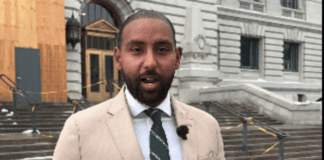
Hadi Matar, accused of attacking author Salman Rushdie, rejected a plea deal that would have shortened his prison term but exposed him to federal terrorism charges.
- Hadi Matar rejected a plea deal that could have reduced his state prison term but included a federal terrorism-related charge.
- The trial is set to begin on September 9, with Matar facing up to 25 years in state prison for attempted murder.
- The attack on Rushdie was allegedly motivated by a decades-old fatwa issued by Iran’s leadership.
Hadi Matar Rejects Plea Deal in Salman Rushdie Case
Hadi Matar, the man charged with stabbing renowned author Salman Rushdie, has rejected a plea deal that would have shortened his state prison sentence but included a federal terrorism-related charge.
Matar, 26, has been held without bail since the attack, which occurred while Rushdie was about to give a lecture at the Chautauqua Institution in western New York.
Hadi Matar Rejects Reduced Sentence Plea Deal
Matar’s attorney, Nathaniel Barone, confirmed the rejection of the plea deal in Mayville, New York. The agreement proposed that Matar plead guilty to attempted murder in Chautauqua County in exchange for a maximum state prison sentence of 20 years instead of 25 years.
Additionally, Matar would have had to plead guilty to a federal charge of attempting to provide material support to a designated terrorist organization, potentially resulting in an extra 20-year sentence.
This plea deal aimed to resolve both the state and federal charges simultaneously, offering a total prison term of 30 to 40 years and a lifetime of supervision post-release.
However, Matar chose to proceed to trial, where he faces a maximum sentence of 25 years in state prison if convicted of attempted murder in the second degree. He is also charged with second-degree assault.
2022 Attack on Salman Rushdie and Its Motivations
On August 12, 2022, Matar allegedly rushed onto the stage at the Chautauqua Institution and repeatedly stabbed Salman Rushdie in the neck, stomach, and right eye, causing serious injuries.
Henry Reese, the event moderator, was also injured during the attack. The motivation behind the attack is believed to be linked to a fatwa issued by Iran’s leadership in 1989, calling for Rushdie’s death following the publication of his novel “The Satanic Verses,” which some Muslims consider blasphemous.
Rushdie had spent years in hiding after the fatwa but re-emerged in the late 1990s and had been living relatively freely for the past two decades.
In his memoir, “Knife: Meditations After an Attempted Murder,” published in April, Rushdie detailed the attack and his recovery.
Background and Personal Life of Hadi Matar
Matar, who was born in the United States and holds dual citizenship in Lebanon, lived with his mother, Silvana Fardos, in Fairview, New Jersey.
Matar became withdrawn and moody after visiting his father in Lebanon in 2018. Matar’s parents divorced in 2004, and his father returned to Lebanon.
Before his arrest, Matar was a member of the State of Fitness Boxing Club in North Bergen, where he was described as quiet and a loner. Despite efforts by gym members to include him, Matar preferred to keep to himself.
Fardos, in an interview on Lebanese television after her son’s arrest, expressed her despair.
Trial Set for Hadi Matar with Rushdie and Reese to Testify
The trial for Hadi Matar is scheduled to begin on September 9. Both Salman Rushdie and Henry Reese are expected to testify.
The trial outcome will determine whether Matar will face the full extent of the charges against him and the length of his prison term.
This case continues to draw significant attention due to the high-profile nature of the victim and the attack’s motivation rooted in historical and geopolitical tensions.









